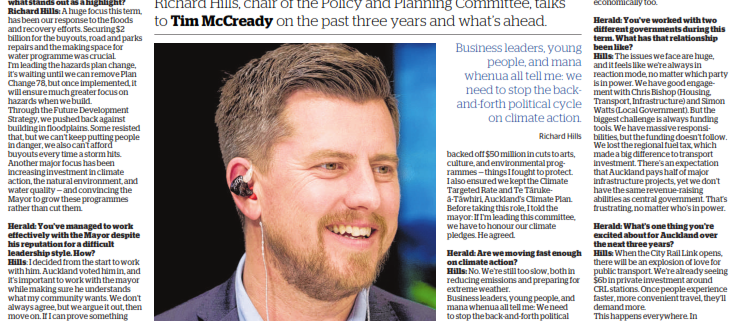Project Auckland: The issues Auckland faces are huge (NZ Herald)
Councillor Richard Hills, chair of the Policy and Planning Committee, talks to Tim McCready on the past three years and what’s ahead.
Looking back on this term, what stands out as a highlight?
Richard Hills: A huge focus this term, has been our response to the floods and recovery efforts. Securing $2billion for the buyouts, road and parks repairs and the making space for water programme was crucial.
I’m leading the hazards plan change, it’s waiting until we can remove Plan Change 78, but once implemented, it will ensure much greater focus on hazards when we build.
Through the Future Development Strategy, we pushed back against building in floodplains. Some resisted that, but we can’t keep putting people in danger, we also can’t afford buyouts every time a storm hits.
Another major focus has been increasing investment in climate action, the natural environment, and water quality – and convincing the Mayor to grow these programmes rather than cut them.
You’ve managed to work effectively with the Mayor despite his reputation for a difficult leadership style. How?
Hills: I decided from the start to work with him. Auckland voted him in, and it’s important to work with the Mayor while making sure he understands what my community wants. We don’t always agree, but we argue it out, then move on.
If I can prove something benefits Aucklanders or the environment and is cost effective, he’ll support it. But it goes both ways.
For example, I didn’t expect to support selling the airport shares, but that decision helped reduce debt and create extra revenue through the Future Fund. In exchange, the Mayor backed off $50 million in cuts to arts, culture, and environmental programmes. Things I fought to protect.
I also ensured we kept the Climate Targeted Rate and Te Tāruke-ā-Tāwhiri, Auckland’s Climate Plan. Before taking this role, I told the Mayor: If I’m leading this committee, we have to honour our climate pledges. He agreed.
You’ve worked with two different governments during this term. What has that relationship been like?
Hills: The issues we face are huge, and it feels like we’re always in reaction mode, no matter which party is in power.
We have good engagement with Chris Bishop (Housing, Transport, Infrastructure) and Simon Watts (Local Government). But the biggest challenge is always funding tools. We have massive responsibilities, but the funding doesn’t follow.
We lost the regional fuel tax, which made a big difference to transport investment. There’s an expectation that Auckland pays half of major infrastructure projects, yet we don’t have the same revenue-raising abilities as central government. That’s frustrating, no matter who’s in power.
Are we moving fast enough on climate action?
Hills: No. We’re still too slow, both in reducing emissions and preparing for extreme weather.
Business leaders, young people, and mana whenua all tell me: we need to stop the back-and-forth political cycle on climate action.
We’re rolling out busways and rail projects, electric buses, improving cycling and walking options, and investing in clean energy, but compared to Australia, Europe, and Asia, we’re falling behind. Other cities are moving faster, and if we don’t keep up, we’ll pay for it economically too.
What’s one thing you’re excited about for Auckland over the next three years?
Hills: When the City Rail Link (CRL) opens, there will be an explosion of love for public transport. We’re already seeing $6 billion in private investment around CRL stations. Once people experience faster, more convenient travel, they’ll demand more.
This happens everywhere. In Australia, when metro or light rail opens, people suddenly want more. The same will happen here.
That’s why it’s frustrating that light rail was cancelled. The city to Māngere corridor still has no rapid transit, despite being one of Auckland’s fastest-growing areas.



